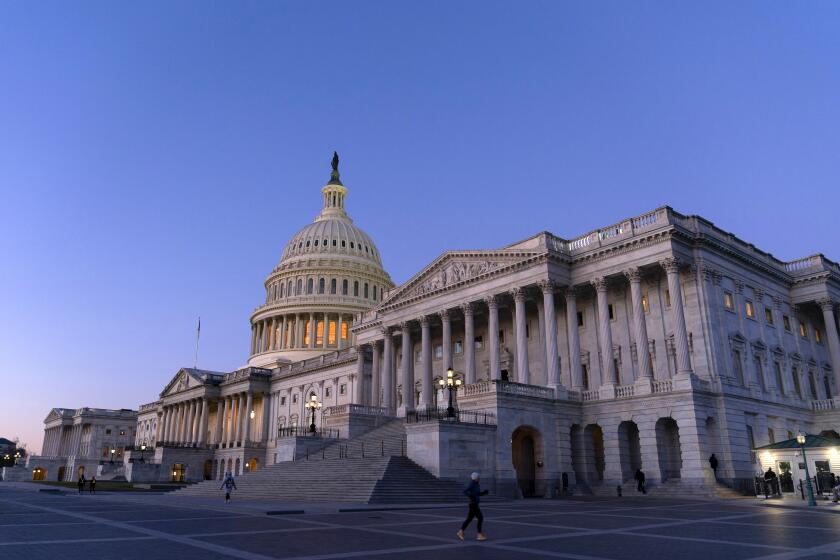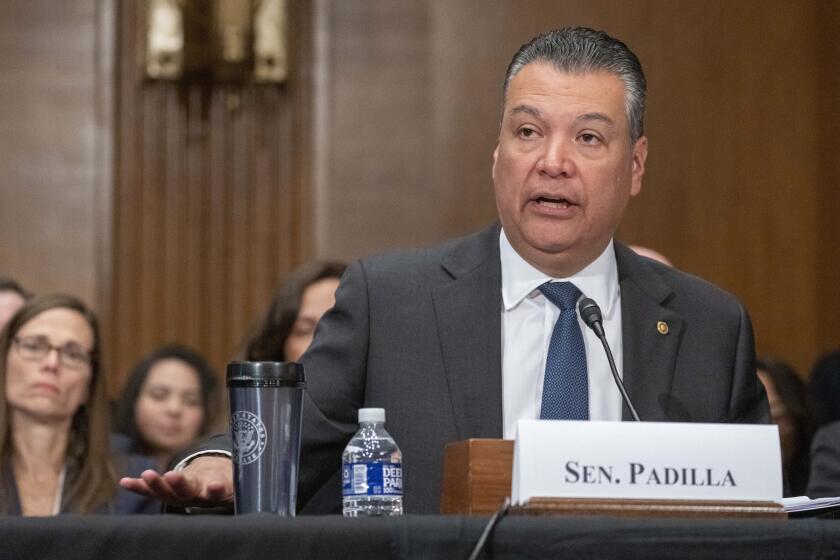California Sen. Alex Padilla convinces colleagues to vote against bipartisan border bill

- Share via
WASHINGTON — Breaking with his own party’s leadership and the Biden administration, California’s Democratic Sen. Alex Padilla helped lead an effort to defeat the bipartisan border security bill that again failed to advance on Thursday.
In an impassioned Senate floor speech, Padilla criticized the legislation as inadequate and encouraged his fellow senators to “do what’s right for Dreamers, farmworkers and other long-term undocumented members of our communities.”
The remarks were his strongest public rebuke yet of the first major immigration reform proposal in years to make headway in Congress.
Padilla’s vigorous opposition to the compromise is the latest example of his willingness to stake out an aggressive position on principle on an issue critical to his state. He was joined by most Republicans, who voted against the bill because they said it did not do enough to secure the border.
The bill included significant provisions to tighten security but none to help change the status of immigrants in the country illegally.
“So the Senate is voting on this package for a second time, but still no vote on the DREAM Act?” he said. “It’s hard to swallow.”
Senate Republicans have blocked a bipartisan border package, scuttling months of negotiation on the legislation.
Senate Majority Leader Charles E. Schumer (D-N.Y.) said he sought Thursday’s floor vote to make the point that Democrats want solutions on the border issue.
Senators voted 50 to 43 against the bill, which Sens. James Lankford (R-Okla.), Christopher S. Murphy (D-Conn.) and Kyrsten Sinema (I-Ariz.) had negotiated for months starting last fall.
A previous vote in February failed by a tally of 49 to 50, well shy of the 60 votes needed to pass. Lankford and Sinema flipped their votes to oppose their measure this time, as did Republican Sens. Susan Collins of Maine and Mitt Romney of Utah.
Padilla played a role in encouraging his colleagues to go against the plan. An aide said the senator had held private conversations with Democrats in the last few months and had contributed to Sens. Cory Booker of New Jersey and fellow Californian Laphonza Butler flipping their votes and opposing the bill.
In a statement after the vote, Butler echoed Padilla’s language, saying the bill “failed to provide comprehensive solutions for critical communities — DACA recipients, farmworkers, and longterm U.S. residents.”
“While there are elements of this bill I support, including funding for our border communities and efforts to prevent the flow of fentanyl, this measure simply misses the mark,” she wrote.
The Senate bill would toughen screenings for asylum and speed up the process, and let presidents immediately expel migrants if arrivals surpass a certain daily threshold.
Immigration has been a core issue of Padilla’s political identity. In his speech, he recalled returning home to California from college “to find hateful TV ads warning of an ‘invasion’ at our border.” The ads were in support of Proposition 187, the 1994 law that sought to deny medical care, social services and education to immigrants suspected of lacking lawful status.
Padilla said that seeing public officials scapegoat and demonize families like his convinced him to join an ensuing movement to bring more Latinos into positions of power.
That hateful rhetoric is back, Padilla said. He pointed to former President Trump’s statement — echoing those by Adolf Hitler — that immigrants are “poisoning the blood” of the country, and Republicans’ declarations that there is an “invasion” at the southern border.
Padilla said such claims are undeniably part of the context in which the border bill was written.
The senator’s independent streak is significant, coming in a critical election year in which Republicans have seized on the issue of immigration, rallying against Democrats for what they see as soft border policies.
Padilla says border state Democrats weren’t part of negotiating the immigration bill, which he says makes extreme changes to the asylum process.
The bipartisan legislation was a fundamental piece of the Biden administration’s shift toward more conservative immigration policies — an effort to help Democrats in vulnerable seats maintain control of the Senate and regain the House.
Padilla’s public opposition to the president on this issue reflects a growing rift among Democrats.
The senator campaigned in 2022 on his desire to reform the immigration system, and personally warned Biden in mid-December not to fold to the GOP.
In his speech Thursday, Padilla pointed out that the immigration proposal was originally meant as a concession to get Republicans to agree to send more aid to Ukraine.
“But guess what, Mr. President? We passed the foreign aid!” he said. “And so I can’t help but ask, what’s this concession for now?”
He also critiqued executive actions on immigration that Biden reportedly plans to announce in the coming weeks, calling them “extreme.” Thursday’s vote was widely seen as a leadup to those measures, which could include a provision that would allow the administration to broadly block migrants from entering the country.
Before the vote, Padilla warned colleagues that history would judge them.
“We should be better than this,” he said.
More to Read
Get the L.A. Times Politics newsletter
Deeply reported insights into legislation, politics and policy from Sacramento, Washington and beyond. In your inbox twice per week.
You may occasionally receive promotional content from the Los Angeles Times.













